Puns in Romeo and Juliet take center stage in this captivating exploration of wordplay, wit, and tragicomedy. From the banter between Romeo and Juliet to Mercutio’s memorable quips, puns permeate the play, shaping characterization, highlighting themes, and creating a unique blend of humor and pathos.
Delving into the cultural and historical context of puns in Elizabethan England, this analysis illuminates how wordplay reflected societal values and beliefs. By examining specific examples and analyzing their significance, we uncover the multifaceted role of puns in one of Shakespeare’s most beloved works.
Wordplay in the Balcony Scene: Puns In Romeo And Juliet
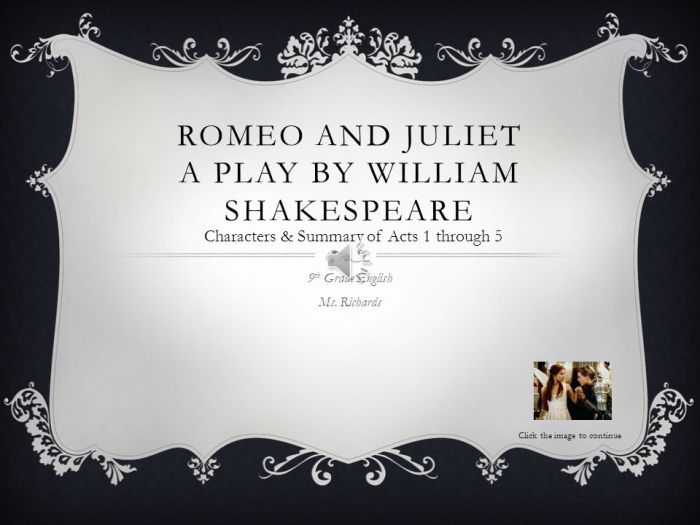
The balcony scene in Romeo and Juliet is a pivotal moment in the play, where the two lovers express their love for each other for the first time. The scene is full of wordplay and puns, which add to the humor and romance of the moment.
One of the most famous puns in the scene is Romeo’s line, “Did my heart love till now? For I ne’er saw true beauty till this night.”
Romeo’s Puns
Romeo makes several puns throughout the scene, many of which are based on the idea of light and darkness. For example, he compares Juliet to the sun, saying, “But soft! What light through yonder window breaks? It is the east, and Juliet is the sun.”
Romeo also uses puns to express his love for Juliet. For example, he says, “My lips, two blushing pilgrims, ready stand to smooth that rough touch with a tender kiss.”
Juliet’s Puns
Juliet also makes several puns in the scene, many of which are based on the idea of love and marriage. For example, she says, “My bounty is as boundless as the sea, my love as deep.”
Juliet also uses puns to express her desire for Romeo. For example, she says, “I have no joy of this contract tonight: it is too rough, too rude, too boisterous; and it prevents the union of our souls.”
| Romeo’s Puns | Juliet’s Puns |
|---|---|
| “Did my heart love till now? For I ne’er saw true beauty till this night.” | “My bounty is as boundless as the sea, my love as deep.” |
| “But soft! What light through yonder window breaks? It is the east, and Juliet is the sun.” | “I have no joy of this contract tonight: it is too rough, too rude, too boisterous; and it prevents the union of our souls.” |
| “My lips, two blushing pilgrims, ready stand to smooth that rough touch with a tender kiss.” |
The wordplay and puns in the balcony scene add to the humor and romance of the moment. They also help to create a sense of intimacy between Romeo and Juliet, as they share a secret language that only they can understand.
Mercutio’s Puns and Banter
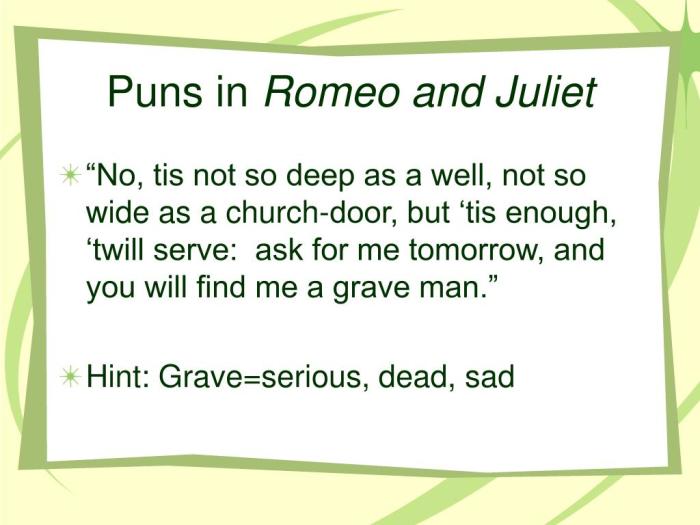
Mercutio, Romeo’s loyal and witty friend, is known for his quick wit and clever use of puns. His wordplay adds humor and depth to the play, highlighting his character’s intelligence and playful nature.
Mercutio’s puns often serve as a form of social commentary, poking fun at the conventions and expectations of his time. For example, when Romeo laments his love for Rosaline, Mercutio responds with a pun on the phrase “pricked by a thorn”: “If love be rough with you, be rough with love; prick love for pricking, and you beat love down.”
This witty retort not only provides comic relief but also suggests that Romeo should take a more assertive approach in his romantic pursuits.
Examples of Mercutio’s Memorable Puns
- “Tybalt, the rat-catcher will have a cat.”This pun plays on the word “cat,” which can refer to both a feline and a weapon used to defend against rats. Mercutio’s use of this pun foreshadows Tybalt’s eventual death at Romeo’s hand.
- “If thou art dun, we’ll draw thee from the mire of this sir reverence love, wherein thou stick’st up to the ears.”In this pun, Mercutio uses the word “dun” to refer to both a horse’s color and a debt collector. The image of Romeo being stuck in a mire of love suggests that he is overwhelmed by his emotions.
- “Ask for me tomorrow, and you shall find me a grave man.”This pun on the word “grave” is both humorous and tragic. It foreshadows Mercutio’s own death in the upcoming duel with Tybalt.
Puns and the Tragicomedy of the Play
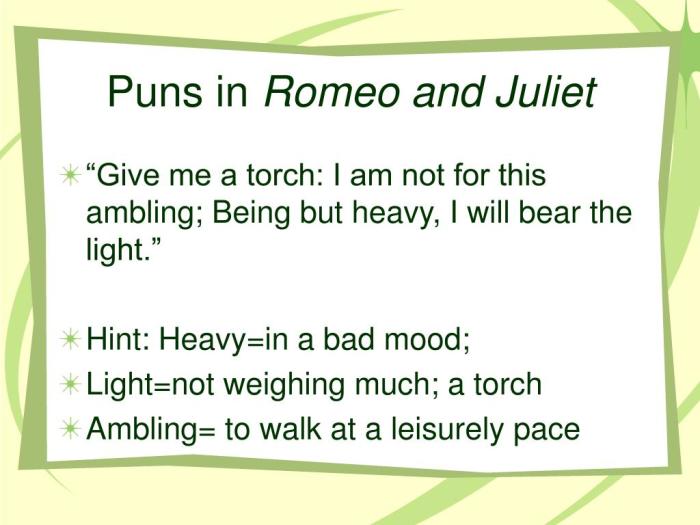
Puns in Romeo and Julietcontribute significantly to the play’s tragicomedy. They provide both humor and pathos, highlighting the play’s contrasting elements of love, loss, and fate.
Puns Creating Humor and Pathos
Puns create humor by playing on words and creating unexpected connections. For example, when Mercutio puns, “Ask for me tomorrow, and you shall find me a grave man,” it foreshadows his tragic death while also providing a humorous moment.
Puns also evoke pathos by highlighting the characters’ emotional turmoil. Romeo’s pun, “O heavy lightness, serious vanity, / Misshapen chaos of well-seeming forms,” expresses his confusion and despair over his love for Juliet.
Puns Highlighting Contrasting Elements
Puns emphasize the play’s contrasting elements by juxtaposing humor and tragedy. For instance, when Friar Laurence puns, “These violent delights have violent ends,” he foreshadows the lovers’ tragic fate while also providing a humorous commentary on the nature of passion.
Similarly, Mercutio’s pun, “If you prick us, do we not bleed? If you tickle us, do we not laugh?” highlights the human condition’s vulnerability and capacity for both pain and joy.
Thematic Significance of Puns
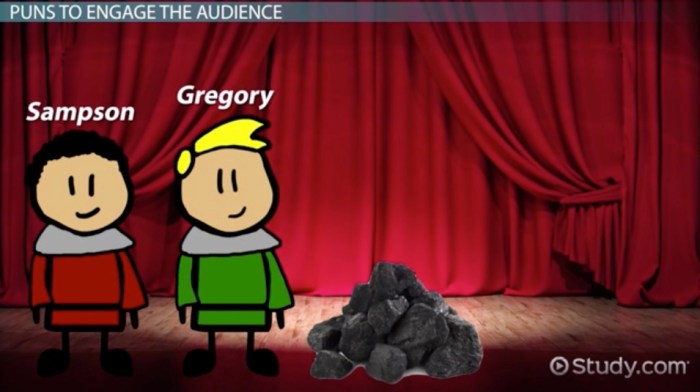
Puns play a significant role in Romeo and Juliet, reflecting the play’s central themes of love, fate, and destiny. Through their use of wordplay and double entendres, puns highlight the complexities and contradictions of these themes, adding depth and nuance to the narrative.
Love and Wordplay
The use of puns in the play’s love scenes underscores the transformative power of love and its ability to alter perceptions. For example, when Romeo first sees Juliet, he puns on her name, calling her “a bright angel” and “a dark lady.”
This pun reflects his conflicting emotions towards her: she is both angelic and mysterious, both a source of light and darkness.
Fate and Irony
Puns also highlight the play’s exploration of fate and destiny. The characters’ frequent use of puns often foreshadows their tragic ends. For instance, Mercutio’s pun on his own death, “Ask for me tomorrow, and you shall find me a grave man,” foreshadows his untimely demise.
Puns and the Play’s Tragicomedy
The use of puns in Romeo and Juliet contributes to the play’s tragicomic nature. By juxtaposing humor and tragedy, puns create a sense of irony and absurdity that underscores the play’s exploration of the human condition. For example, the Nurse’s pun on Romeo’s name, “If you should lead this rhyming mood of yours, make haste and be gone,” adds a touch of humor to the tragic events unfolding.
Did you know that Romeo and Juliet is full of puns? For example, when Romeo says, “I am a fortune’s fool,” he is using a pun on the word “fortune,” which can mean both “luck” and “wealth.” If you’re interested in learning more about puns in Romeo and Juliet, or if you’re studying for the med surg ati test bank , be sure to check out our website for more information.
Cultural and Historical Context of Puns
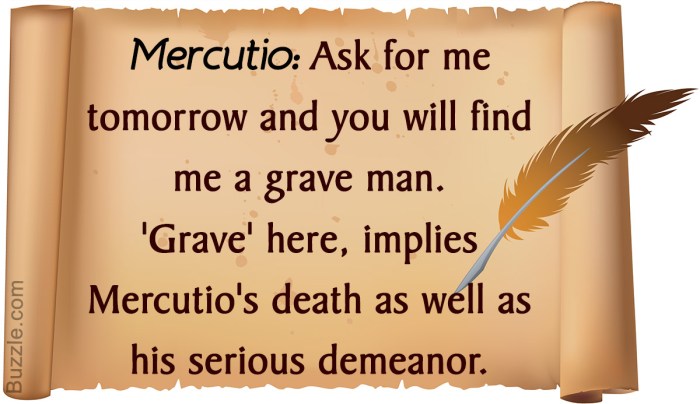
Puns were a popular form of wordplay in Elizabethan England, reflecting the era’s fascination with language and wit. They were used in various social contexts, from courtly entertainment to everyday conversation.
Puns in Elizabethan Society, Puns in romeo and juliet
Puns served multiple purposes in Elizabethan society. They were a way to demonstrate one’s cleverness and erudition, as well as a means of humor and entertainment. Puns were also used to convey hidden meanings or to make subtle criticisms without being overt.
Cultural Significance
The prevalence of puns in Elizabethan England reflects the era’s emphasis on wordplay and linguistic dexterity. It was a time when language was seen as a tool for both communication and entertainment, and puns were a way to showcase one’s mastery of language.
Puns also reveal the Elizabethan fascination with ambiguity and the interplay between different meanings of words.
Examples of Culturally Significant Puns
* “I love thee with a love that knows no bounds.” (Bounds: both physical and emotional)
“I am a poor man, but I am a gentleman.” (Gentleman
both a person of good breeding and a man who is poor)
“I am a fool, but I am a happy fool.” (Fool
both a person who lacks intelligence and a person who is carefree)These puns demonstrate the Elizabethan fascination with wordplay and the use of puns to convey multiple meanings. They also reflect the era’s emphasis on wit and cleverness as desirable qualities.
FAQ Section
What is the significance of puns in the balcony scene?
The puns in the balcony scene reveal the wit and wordplay between Romeo and Juliet, highlighting their growing affection and the playful nature of their courtship.
How do Mercutio’s puns contribute to his characterization?
Mercutio’s use of puns reflects his lively and extroverted personality, as well as his role as a witty observer of the events unfolding around him.
In what ways do puns contribute to the tragicomedy of the play?
Puns create a juxtaposition of humor and pathos, highlighting the play’s contrasting elements of love and loss, joy and sorrow.